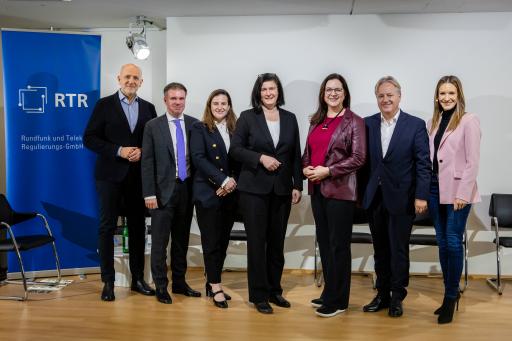AI experts and media professionals discussed in an intensive exchange during the second KI Impact Dialogues from RTR Medien on December 12th about current developments, challenges and findings on the use of artificial intelligence in the media sector. The event was also a reflection of the work results from a year “AI Media Roundtable“, a platform made up of high-ranking representatives from institutions and associations in the media industry. It was created as part of the establishment of the Austrian AI service point initiated by the media department at Rundfunk und Telekom-Regulierungs-GmbH (RTR). The aim of the roundtable is to identify priority issues surrounding the use of AI in the media sector.
AI media roundtable and industry survey on AI labeling
This was one of the central topics of the specialist event Result of an industry surveythat the RTR media too Labeling options when using AI-generated content had carried out. This resulted in, among other things, labeling forms for image, video, audio and text content favored by media professionals.
Dr. Jeannette Gorzaladeputy chairwoman of the AI Advisory Boardreported on the work of the “KI Media Roundtable” on the challenges in the three major areas Copyright, technology and regulation.
Mag. Wolfgang StruberManaging Director of RTR Mediaemphasized the importance of the industry’s exchange within the framework of the AI media roundtable, also from a democratic and ethical perspective: “To Preservation of democratic political discourse in Austria, has the protection of one diverse and trustworthy Austrian media landscape top priority in competition against the big players from the USA and China. AI can help to survive in this competition. At the same time, care must also be taken to ensure that new, domestic digital offerings are not ultimately undermined in terms of content by the tech companies,” says Struber.
Leading media representatives on the opportunities and challenges of AI
The representatives of the Austrian media landscape present spoke at a Panel discussion (Moderation: Road Fleißner) about future developments and necessary steps to secure the media market.
Mag. Verena KrawarikHead of Innovation WHAT and APA-medialab and member of the AI Advisory Board, explained: “An important factor lies in the topic of AI literacy. To achieve this, we as media companies not only have to build up and continually expand our AI expertise ourselves, but we also have to make our work with AI transparent and explain it. This also enables the development of digital skills among our users. In addition, it is important to take advantage of the opportunity to initiate and implement AI projects in collaborations. There are already an incredible number of ideas and approaches in international exchange with other market participants,” says Krawarik.
Mag. Gerald GrünbergerManaging Director of the Association of Austrian Newspapers (VÖZ), added: “AI will affect the entire media industry and content production like a tsunami. Even though we are only at the beginning of this wave, it is important to swim or surf this wave as best as possible without sinking. With regard to the implementation of the AI regulation, further clarification will be required for the media sector, especially when it comes to protection and traceability for rights holders when their valuable content is accessed by crawlers.
Dr. Harald HerbsDirector of Technology and Digitalization of the ORFalso highlighted the importance of AI and media competence as well as the responsibility in dealing with artificial intelligence: “It is important to train journalists in how to use AI and to give them tools with which they can experiment and learn that AI can be a support in everyday work. AI can take over repetitive work, leaving more time for core tasks such as fact checks, background stories, reports, etc. The quality of journalism can therefore increase. But rules must be adhered to. “AI can also help increase accessibility,” says Kräuter.
Also Dipl.-Cffr. Corinna DrummManaging Director of the Association of Austrian Private Broadcasters (VÖP), spoke about the challenges that AI brings in the media sector: “Artificial intelligence will change a lot of processes in media companies. It’s not just about media production, but also about distribution and media reception. It is important to note that traditional editorial media, which are subject to appropriate legal and ethical rules, do not pose a major threat. Rather, the focus should be on large platforms that are already being used for disinformation and where AI can be an accelerant.”
The industry survey on labeling options for AI in the media industry as well as the work results of the AI Media Roundtable are available on the AI Service Center website ki.rtr.at available.
About RTR Media
The media department of Rundfunk und Telekom Regels-GmbH (RTR Medien) is Austria’s largest funding agency for media companies (radio, podcasts, television, print, television films). It also acts as a service, complaint and dispute resolution point. As a competence center, RTR Medien shares its knowledge in studies, reports or events. Rundfunk und Telekom Regels-GmbH (RTR) is a federal institution and is divided into two departments: media (RTR Medien, managing director Wolfgang Struber) and telecommunications and post (RTR.Telekom.Post, managing director Klaus M. Steinmaurer). The two departments in common are the offices of the Communications Authority Austria (KommAustria), Telekom Control Commission (TKK) and Post Control Commission (PCK). www.rtr.at
